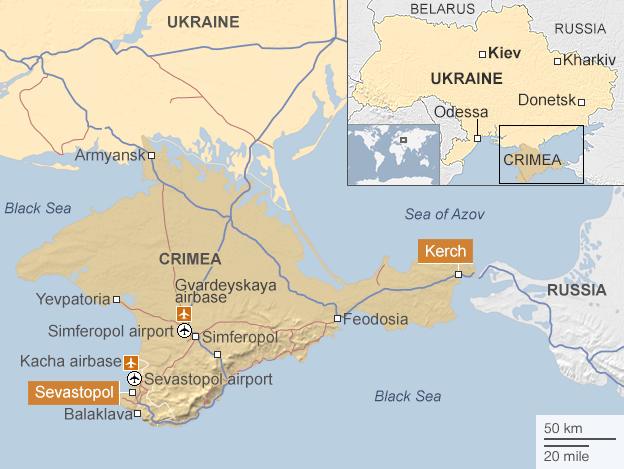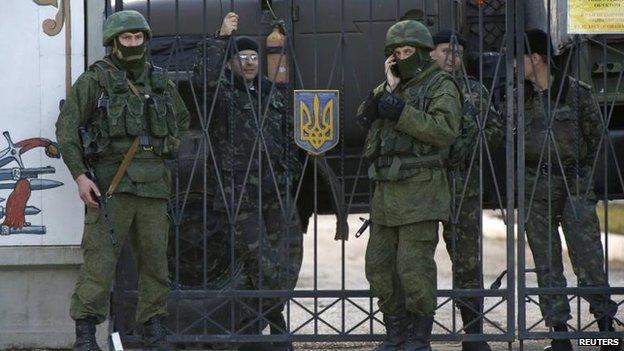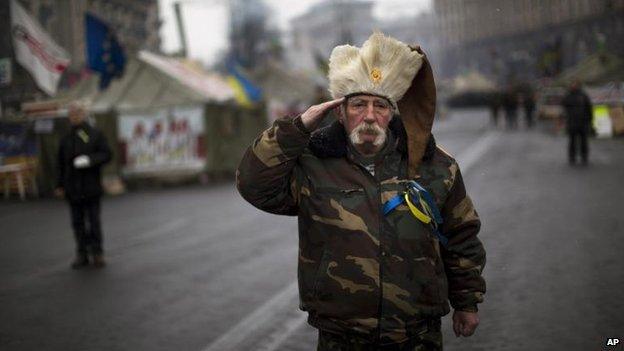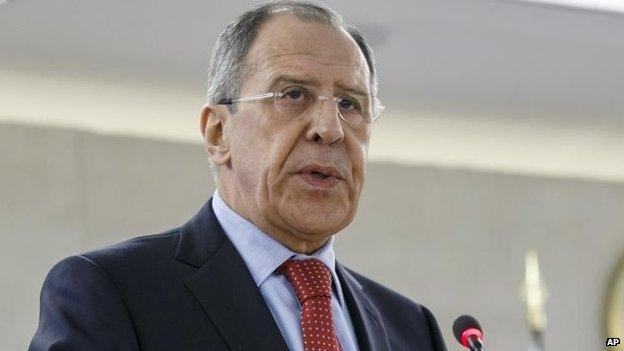Ukraine crisis: Russia vows troops will stay
- Published
World Affairs Editor John Simpson: "Without, apparently, a shot being fired, Russia has taken control of the Crimean peninsula"
Russia has vowed its troops will remain in Ukraine to protect Russian interests and citizens until the political situation has been "normalised".
Foreign Minister Sergei Lavrov said Russia was defending human rights against "ultra-nationalist threats".
Russia is now in de facto military control of the Crimea region, despite Western condemnation of a "violation of Ukraine's sovereignty".
Ukraine has ordered full mobilisation to counter the military intervention.
Crimea is the main flashpoint, but there are also demonstrations in eastern Ukraine.
Some 2,000 people waving Russian flags gathered at the regional government building in Donetsk to protest at the appointment of a new pro-Kiev governor.
Dozens later occupied the first floor of the building in Donetsk, the hometown of ousted pro-Russian President Viktor Yanukovych.
Mr Lavrov said in Geneva on Monday that the new authorities in Kiev "intend to make use of the fruits of their victory to attack human rights and fundamental freedoms of minorities".
He said the "violence of ultra-nationalists threatens the lives and the regional interests of Russians and the Russian speaking population".
Mr Lavrov, who will meet UN Secretary General Ban Ki-moon later, also condemned Western threats of sanctions and boycotts.
In Kiev, Ukraine's Prime Minister Arseniy Yatsenyuk said that any attempt to seize Crimea would fail.
However, he also said that "for today, no military options are on the table", urging instead international economic and political support.
The crisis has hit Russian stock markets, with Moscow's main MICEX index dropping 9% in early trading. The rouble fell to an all-time low against the US dollar and Russia's central bank raised its key lending rate to 7% from 5.5%. World oil prices also surged.
The BBC's Mark Lowen in Sevastopol says Crimea is now under de facto Russian armed control although no shots have been fired.
Two large Ukrainian military bases are surrounded and key installations like airports are occupied.
Thousands of newly arrived Russian elite troops far outnumber Ukraine's military presence, our correspondent says, with roadblocks cutting off Crimea.
Ukrainian border guards have reported a build-up of armoured vehicles on the Russian side of the sea channel dividing Russia and Crimea.


Soldiers, believed to be Russian, in the village of Perevalnoye outside Simferopol

A supporter of the interim government salutes as the Ukrainian national anthem is played in Kiev

Sergei Lavrov condemned Ukrainian ultra-nationalists with "anti-Semitic tendencies"
Pro-Russian troops have taken over the ferry terminal at Kerch in far-eastern Crimea that operates services to Russia.
Ukrainian navy commanders on Monday confirmed their loyalty to Kiev, the Interfax-Ukraine news agency reported, despite an attempt by pro-Russian personnel to enter the navy HQ in Simferopol and force them to switch allegiance.
The BBC's Sarah Rainsford in Kiev says Ukraine's interim government has called for more international support to force Russian troops to leave.
Men across Ukraine have been receiving call-up papers and will start reporting for 10 days training from Monday.
Our correspondent says there is widespread anger at Russia's actions - and many Ukrainians say they are prepared to fight to defend their territory.
Late on Sunday, the G7 of major industrialised powers condemned Moscow's military build-up.
In a statement released from the White House, external, the grouping said it condemned "the Russian Federation's clear violation of the sovereignty and territorial integrity of Ukraine".
It added: "We have decided for the time being to suspend our participation in activities associated with the preparation of the scheduled G8 Summit in Sochi in June."
Diplomatic moves are continuing, however, to try to find a solution.
European Union foreign ministers are due to meet in emergency session in Brussels.
Christian Fraser spoke to members of the Ukrainian navy who want the country to "stay together"
UN Deputy Secretary-General Jan Eliasson is travelling to Ukraine to be "personally apprised of the facts on the ground".
UK Foreign Secretary William Hague, who is in Kiev, said the crisis in Ukraine was the biggest that Europe had faced this century.
US Secretary of State John Kerry is to travel to Ukraine on Tuesday.
Moscow has not recognised the government that took power in Kiev last month after ousting Mr Yanukovych.
Mr Yanukovych's decision in November to abandon closer ties with the EU in favour of Russia sparked massive protests in Kiev, which ended in a bloodbath, as dozens of protesters were shot dead in clashes with police.
Are you in Ukraine? What is your reaction to this news of Russian troop deployment? Email us at haveyoursay@bbc.co.uk adding 'Ukraine' in the subject heading and including your contact details.